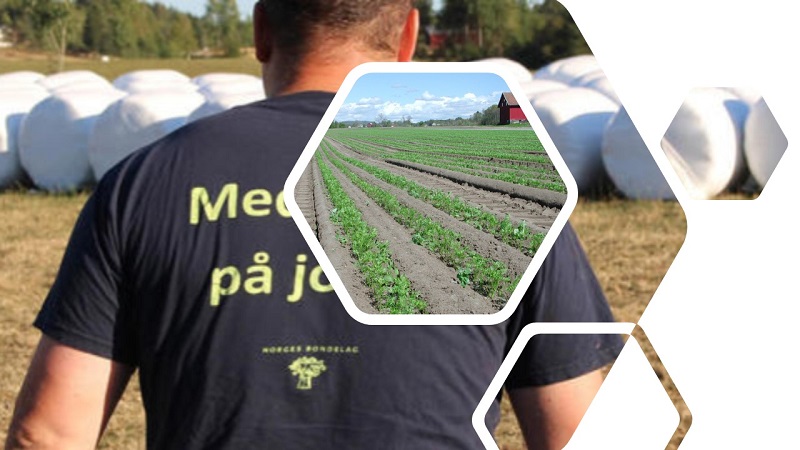Due to the COVID-19 pandemic, Norway has closed its borders. Foreigners are not allowed to enter the country. As the activity on many farms, in particular in the fruit and vegetable sector, depend on foreign seasonal workers, closed borders represent a major problem for farmers and their ability to maintain the production.
Farmers producing local and high-end products for restaurants are struggling to make ends meet. Through the market regulation system, they can still deliver meat and dairy products, but to a much lower price. Farmers producing services and activities connected to the farm, like green care and tourism, are also struggling. The COVID-19 pandemic has eliminated all tourism in the entire country. That has severe economic consequences for the farming sector.
For the time being, all schools and kindergartens are closed in Norway. Farmers and farm workforce with small children may have reduced capacity to run their farm as long as they also have to take care of their children. That might also affect the veterinary service that farmers are dependent on. Quarantine rules might have a similar effect.
Farmers’ Health: Measure adopted by Norwegian Farmers
Farmers are making sure the workforce on the farm and visitors to the farm, like veterinaries and product handlers, follow the advice strictly from the health authorities with hand wash, coughing routines etc. The food purchasers, like coops, have released rules on how the farmers should behave when they visit the farms. Each farm must have an emergency plan, stating who takes over if the farmer falls ill. The farmer must make sure that this plan is up to date. The farmer is allowed to look after his or her own animals even if he/she is in quarantine, or has attracted the coronavirus, but has to alert visitors to the farm and take measures to prevent the illness from being transferred. Farmers in isolation because of the corona must be particularly stringent with hand- and coughing hygiene and must not work together with others. If the farmer gets sick, he/she will get the right to sick leave and economic support for a replacement, and he can use our farmworker replacement scheme.
Norwegian Farmers’ challenges due to COVID19
The main challenge for the agricultural sector is to secure enough workforce, particularly in the primary production, but also in the processing industry. Most of the activity in the fruit-, vegetable- and potato-sectors is dependent on seasonal workers from other countries. With limited access to the workforce, it will be impossible to maintain production. The farmers` union has been working continuously with the government to get solutions. The rules are now eased so workers in the primary sector and the industry can access our country. But still, quarantine rules can be a challenge. Access from countries outside the EU area is still a challenge. The farmers` union has also worked towards the government to find ways of recruiting laid-off workers into the agricultural sector.
Trade constraints and reduced activity in the processing industry may affect the supply of goods and inputs necessary for farmers and the agricultural sector. The pandemic has also amplified the weakening of our currency and created a more fluctuating international market with possibly higher prices in the long term, resulting in higher prices on imported input goods.
How Norges Bondelag is helping the Norwegian farmers
Norges Bondelag is providing its farmers with updated information and advice on how to tackle the COVID-19 through its web site, newsletters and social media, and through meetings within the organisation at all levels. It has worked towards the government to find solutions for foreign workforce into the country and getting laid off Norwegian workers to fill some of the vacancies. That has partly succeeded. Norges Bondelag has also been working on achieving economic guarantees for farmers taking the risk to plant or saw even though they do not know if they get enough workforce on the farm. For farmers losing their direct sales market for restaurants, the Norwegian Agrarian Association is looking to get compensation from the crisis packages from the government for small businesses. Click here to learn more
Norwegian Government ’s actions to support farmers
The government has provided economic stimulus packages to businesses to mitigate the long-term effects of the coronavirus crisis. Several of these measures will also be addressed to farmers and the agricultural sector.
The government has defined the food sector as a critical sector in Norway. One implication of this is that workers in the food production chain and seasonal agricultural workers are exempted from the strict border control and will be allowed to enter the country.
The parliament has requested the government to do what is necessary to secure enough workforce in agriculture to maintain production levels this year. The government has proposed that Norwegian workers wanting to work in agriculture will keep 50% of their unemployment benefits. The parliament has also requested the government, in cooperation with the agricultural sector, to implement measures that stimulate increased plant-based food production this season.
Food production value chains’ implemented measures
The farmers have been pushing to get rules in place to secure workforce in place, in particular for the fruit and vegetable sector, and compensation for loss in direct sales to restaurant, tourism and green care and other farm services. Retailers have promised to prioritise buying Norwegian products. Since agriculture is defined as a critical sector for society to function, the whole food chain gets exemptions to maintain the logistics of the food value chain.
